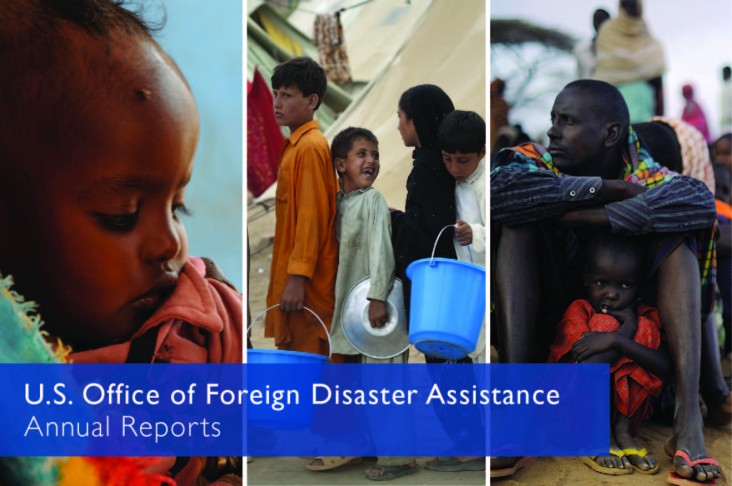- What We Do
- Agriculture and Food Security
- Democracy, Human Rights and Governance
- Economic Growth and Trade
- Education
- Ending Extreme Poverty
- Environment and Global Climate Change
- Gender Equality and Women's Empowerment
- Global Health
- Water and Sanitation
- Working in Crises and Conflict
- Disaster Assistance
- Political Transition Initiatives
- Conflict Mitigation and Prevention
- Countering Violent Extremism
- Disaster Risk Reduction
- Peacebuilding and Reconciliation
- Providing Safe & Secure Environments for Development
- Recovering From Crisis
- Resilience
- Tech Challenge for Atrocity Prevention
- World Humanitarian Day
- U.S. Global Development Lab

Fiscal Year 2015: Year in Review
In fiscal year (FY) 2015, USAID's Office of U.S. Foreign Disaster Assistance (USAID/OFDA) responded to 49 humanitarian emergencies in 45 countries, assisting tens of millions of disaster-affected individuals around the world.
Nearly 60 percent of USAID/OFDA’s FY 2015 funding supported humanitarian activities in Africa. In West Africa, USAID/OFDA responded to an Ebola outbreak in Guinea, Liberia, Mali, and Sierra Leone. With approximately $717 million for the regional Ebola response, USAID/OFDA supported a range of humanitarian activities that helped slow transmission and increase capacity to prevent and respond to new cases, including providing health care support, facilitating safe burials, and raising community awareness of Ebola detection and prevention measures. USAID/OFDA also responded to conflict-related emergency needs in a number of West African countries, as well as food insecurity in Senegal and a volcano in Cabo Verde.
USAID/OFDA continued to provide critical, life-saving assistance in response to ongoing conflict and displacement in South Sudan and Sudan’s Darfur Region and the Two Areas. USAID/OFDA also met conflict-related needs in the Central African Republic, the Democratic Republic of the Congo, and Somalia, and provided nutrition assistance in Kenya. In Southern Africa, USAID/OFDA supported flood-affected communities in Madagascar, Malawi, and Mozambique.
As the crisis in Syria extended into its fifth year, an estimated 12.2 million people in the country required urgent humanitarian assistance. USAID/OFDA provided more than $303 million—the largest funding amount to a single country response in FY 2015—to support crisis-affected individuals in Syria. Through local partners, international non-governmental organizations, and UN agencies, USAID/OFDA prioritized the delivery of relief commodities and support for emergency medical care, in addition to protection, shelter, and water, sanitation, and hygiene interventions. Elsewhere in Europe, the Middle East, and Central Asia Region, USAID/OFDA assisted conflict-affected populations in Iraq, Ukraine, and Yemen and mudslide-affected communities in Tajikistan.
In Asia, USAID/OFDA supported populations affected by complex emergencies in Afghanistan, Burma, and Pakistan. In addition, USAID/OFDA responded to humanitarian needs arising from natural disasters, including drought, floods, and landslides, as well as the magnitude 7.8 earthquake that struck central Nepal in April and a volcanic eruption in the Philippines. USAID/OFDA also continued to prioritize disaster risk reduction (DRR) programs in Asia, investing in local capacity to prepare for and mitigate the potential impacts of future disasters. In Latin America and the Caribbean, USAID/OFDA responded to emergency needs resulting from floods, fires, and a tornado. USAID/OFDA also implemented numerous DRR programs in the region to strengthen local response capacity and promote techniques to mitigate the effects of disasters.
Throughout FY 2015, USAID/OFDA maintained Disaster Assistance Response Teams (DARTs) for the complex crises in Iraq, South Sudan, and Syria and for the Ebola outbreak in West Africa, and deployed a DART to respond to the effects of the earthquake in Nepal. USAID/OFDA also maintained or stood up corresponding Washington, D.C.- based Response Management Teams (RMTs) to facilitate coordination efforts. USAID/OFDA provided more than $1.9 billion in assistance in FY 2015, including more than $1.6 billion for disaster response activities. These interventions saved lives while also promoting early recovery and building resilience to future stresses, as the situation allowed. In FY 2015, USAID/OFDA also contributed nearly $90 million in DRR funding to help communities across the world prepare for and mitigate the effects of disasters, as well as approximately $66 million for disaster response programs that incorporated DRR activities.







Comment
Make a general inquiry or suggest an improvement.